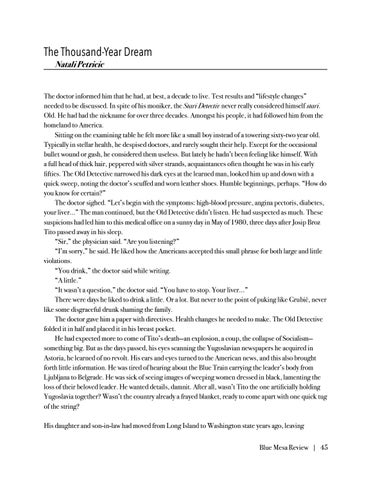The Thousand-Year Dream Natali Petricic
The doctor informed him that he had, at best, a decade to live. Test results and “lifestyle changes” needed to be discussed. In spite of his moniker, the Stari Detectiv never really considered himself stari. Old. He had had the nickname for over three decades. Amongst his people, it had followed him from the homeland to America. Sitting on the examining table he felt more like a small boy instead of a towering sixty-two year old. Typically in stellar health, he despised doctors, and rarely sought their help. Except for the occasional bullet wound or gash, he considered them useless. But lately he hadn’t been feeling like himself. With a full head of thick hair, peppered with silver strands, acquaintances often thought he was in his early fifties. The Old Detective narrowed his dark eyes at the learned man, looked him up and down with a quick sweep, noting the doctor’s scuffed and worn leather shoes. Humble beginnings, perhaps. “How do you know for certain?” The doctor sighed. “Let’s begin with the symptoms: high-blood pressure, angina pectoris, diabetes, your liver…” The man continued, but the Old Detective didn’t listen. He had suspected as much. These suspicions had led him to this medical office on a sunny day in May of 1980, three days after Josip Broz Tito passed away in his sleep. “Sir,” the physician said. “Are you listening?” “I’m sorry,” he said. He liked how the Americans accepted this small phrase for both large and little violations. “You drink,” the doctor said while writing. “A little.” “It wasn’t a question,” the doctor said. “You have to stop. Your liver…” There were days he liked to drink a little. Or a lot. But never to the point of puking like Grubić, never like some disgraceful drunk shaming the family. The doctor gave him a paper with directives. Health changes he needed to make. The Old Detective folded it in half and placed it in his breast pocket. He had expected more to come of Tito’s death—an explosion, a coup, the collapse of Socialism— something big. But as the days passed, his eyes scanning the Yugoslavian newspapers he acquired in Astoria, he learned of no revolt. His ears and eyes turned to the American news, and this also brought forth little information. He was tired of hearing about the Blue Train carrying the leader’s body from Ljubljana to Belgrade. He was sick of seeing images of weeping women dressed in black, lamenting the loss of their beloved leader. He wanted details, damnit. After all, wasn’t Tito the one artificially holding Yugoslavia together? Wasn’t the country already a frayed blanket, ready to come apart with one quick tug of the string? His daughter and son-in-law had moved from Long Island to Washington state years ago, leaving Blue Mesa Review | 45







